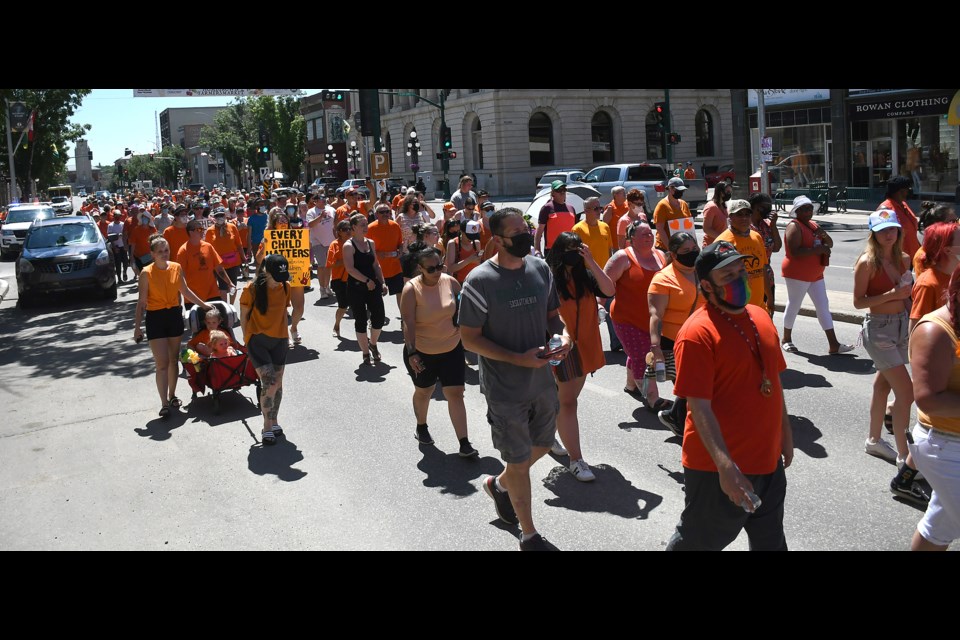For some, the stories were heartrending; stories of abuse and isolation, of sorrow and fear felt by their parents and grandparents who were forced into the residential school system as children.
For others, it was a chance to express anger and frustration at a system that for far too long has remained at a standstill when it comes to advancing Indigenous causes and attempts at healing, even as the horrors of the past now come to light on a regular basis.
But there was one common thread through it all — a feeling of support for a community in dire need of it as they relive some of the worst times in their history.
More than 250 people gathered on the 200 block of Main Street on Canada Day for the rally, the vast majority wearing orange shirts in support of the thousands of children lost in the residential school system, never to be seen again.
The event was part of the Our Home On Native Land movement, with Wakamow Aboriginal Community Association chair Lori Deets one of the main organizers.
“I’m really, really happy with the day. Even with the heat it was still fantastic,” she said. “If you can get this many people out when it’s 34 degrees out, it shows this is something that people believe in and it’s not just the Indigenous people.
“You saw there were people of all communities here supporting us, and that’s fantastic to see. We had things we had to say, and I hope a lot of those messages were streamed live out there, too, because they need to be heard.”
Many of the speakers, including Deets herself, gave impassioned speeches that touched on issues ranging from systemic racism to a lack of respect for Indigenous issues and people, even including the reading of some of the most vicious and heinous social media posts made leading up to the event, some by Moose Jaw residents.
The stories from the residential schools themselves were among the most resonant, though, and laid out just how awful those experiences were for those who lived them.
“They were so hard to hear, and there were so many people who wanted to tell their stories or at least help others tell their stories,” Deets said, adding that over a dozen people took part in the planning and preparation of the event, including the gathering of oral traditions. “No one had to take this on by themselves, we need each other. So we’re able to take the pain and also heal together, which is part of the whole process.”
To help in that direction, a spiritual component was also included — Shylo Stevenson from Regina was on hand with a smudge.
“In our culture, having the smudges out helps call on our spirits and helpers and everything else,” Stevenson explained. “So it was nice to have that component and being asked to bring that in. It’s instrumental in any ceremony when we ask for our ancestors to come in and help us and guide us in a positive way.”
Like Deets, Stevenson was happy to see the support of Moose Jaw and that of communities all over the country — large ceremonies took place in Regina and Saskatoon, and cities and towns all over Canada adopted orange as their colour for the July 1 holiday.
Seeing this all happening as more and more atrocities come to light is heartening, he said, but not surprising.
“It’s different from my perspective. In Indian Country, we grew up knowing,” Stevenson said. “The oral traditions were handed down and we knew. But the Creator never makes a mistake, and these discoveries and everything, it’s a time for healing. It’s the Creator’s decision for that to come forward now and reach out to others to help us heal and reconcile our past… This was a good step for Moose Jaw and all across Canada.”
Deets admits that as tough as these first steps have been, they’re just the latest in what has to be a journey that continues in the right direction.
“It’s very difficult, but we have to keep going,” she said. “It’s like everything, we don’t go backwards in time, we go forwards and Indigenous people have gone forwards and taken every step they have because they’re strong. We’re here today not because people have defeated us, we’ve fought for every step we’ve taken because we’re strong, strong people.”

.png;w=120;h=120;mode=crop)


